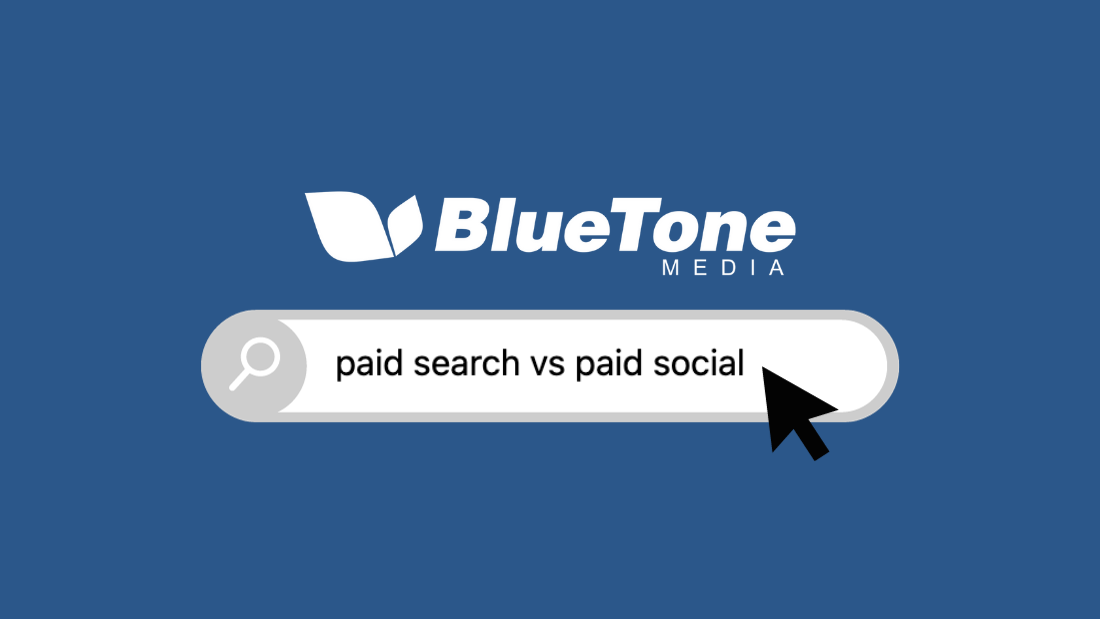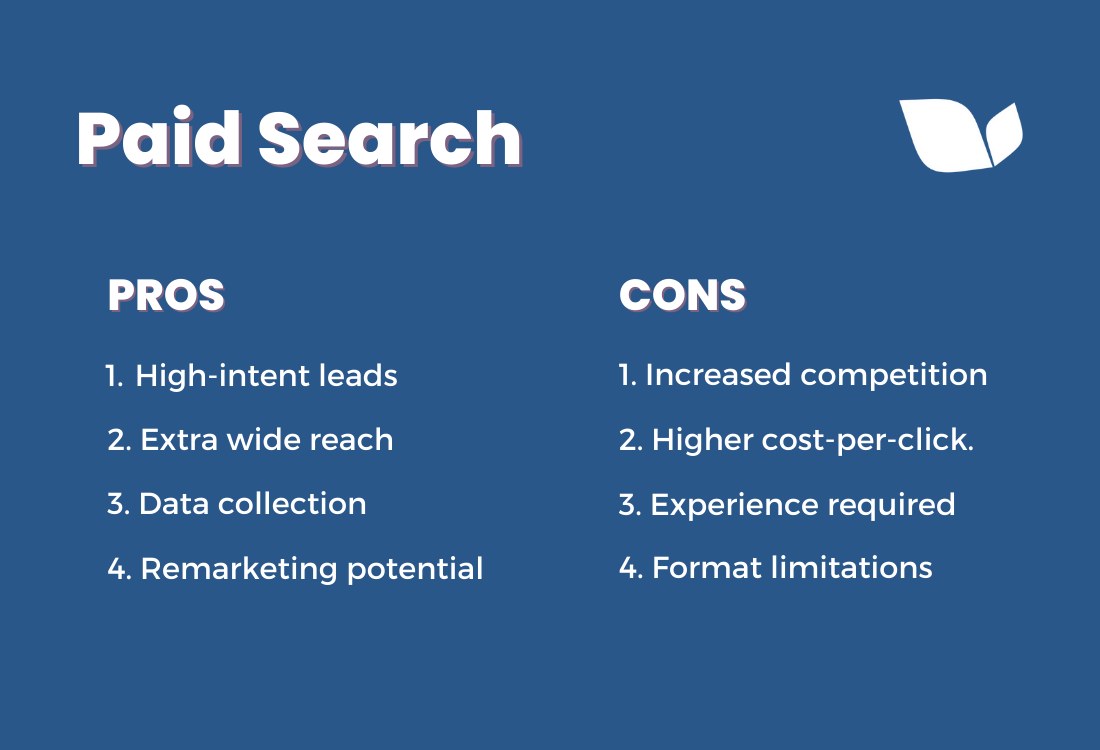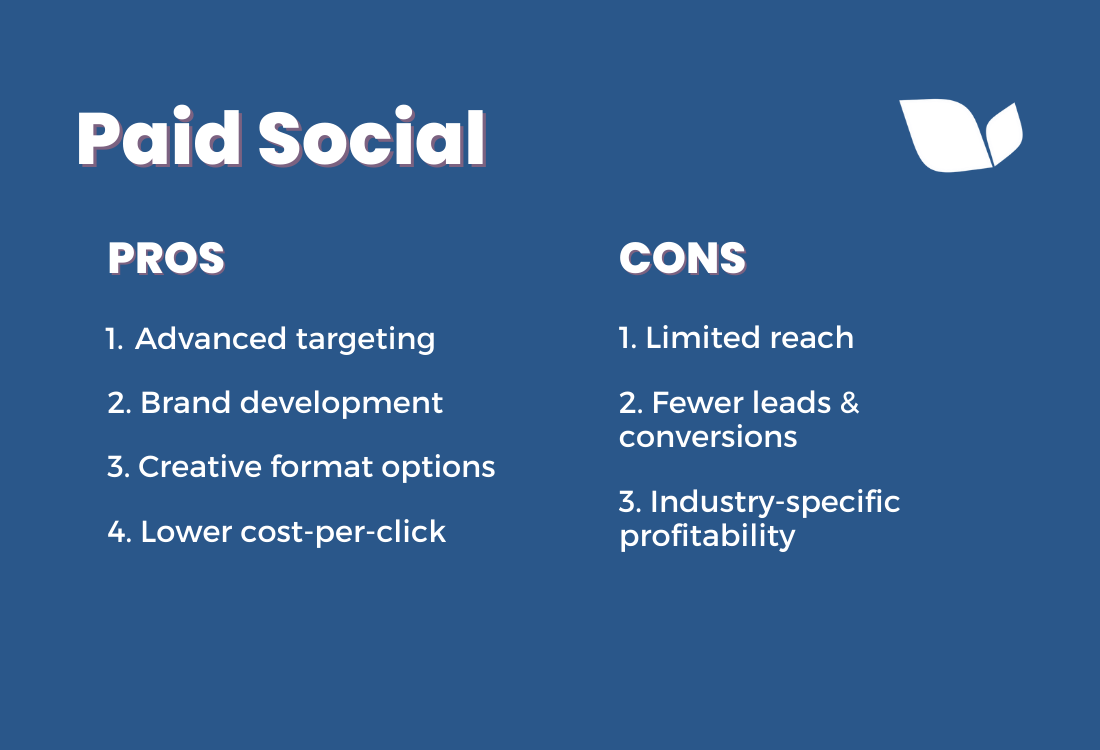Paid Search VS. Paid Social: Which to Pick For a Small Business?

You’re developing your marketing strategy and have come to a crossroads…
Paid search OR paid social?
This question is a tricky one – especially since our honest answer is actually both!
BUT…we realize that’s not very helpful to you right now. So, we’ll do our best to explain the pros and cons of each form of digital advertising below.
In this blog, we will…
- Explain paid search and paid social media basics
- Explore the benefits and limitations of each marketing method
- And help you determine which option will be most effective for your small business
Let’s define “paid search”
So, what are we talking about when we use the term paid search?
Paid search is a form of Search Engine Marketing (SEM) that businesses use to rapidly increase their online visibility and secure a high position in search results.
Google Ads is by far the most popular search engine for paid advertising.
Google search ads look a lot like your basic search result. But unlike the organic search rankings you earn with a Search Engine Optimization (SEO) strategy, businesses secure search ad placement by bidding on relevant keywords. Not only do Google Ads require payment, but they also feature a “Sponsored” tag and appear at the very top of the search engine results page (SERP).
Along with paid social media, search ads fall into the Pay-Per-Click category – which, as the name suggests, means advertisers only pay when someone clicks on their ad.
This, as well as the practically instantaneous results, make paid search a seriously effective method of attracting online traffic to your small business.

Pros of search ads for small businesses
There’s a reason paid search is the dominant form of digital advertising across the board.
With paid search, you can…
- Capture high-intent buyers.
- Reach a wide audience.
- Track lots of valuable data.
- Conduct powerful remarketing campaigns.
1. Capture high-intent buyers
If you want quick leads and sales, paid search is absolutely for you! With a strong keyword strategy, you’ll get your business in front of people who are ready to make a purchase. For example, if someone’s water heater breaks, they’ll likely pick up their phone and search for plumbers in the area. A search ad will place your plumbing business in front of the user the very moment they need your services.
2. Reach a wide audience
Google processes an estimated 5.8 billion searches a day. With this kind of reach, you can expect major results – no matter the industry. And while social media ads may be successful for certain kinds of businesses (particularly B2B companies), Google Ads have proven successful for B2C and B2B businesses alike.
3. Track LOTS of valuable data
Google Ads makes it super easy to measure ad performance. You can analyze critical data, experiment with alternative keywords and ad copy, and maximize your ad spend. Plus, other online tools – like SEM Rush, HubSpot, and Keyword Tool – help marketers track useful keyword data and continually optimize their paid search strategy.
4. Conduct powerful remarketing campaigns
With Google’s comprehensive data, you can easily reconnect with people who have already visited your website. This multi-touch digital marketing strategy increases your chances of converting those users into paying customers.
Cons of paid search
Google search ads do have a few drawbacks you should consider before you dive headlong into a paid search campaign:
1. More competition
Securing Google search ad placement is a little more complex than just choosing a keyword and hitting the launch button. The popularity of Google search ads is both a testament to its power AND the reason it can be quite the challenge to win ad placement for your chosen keywords.
2. Higher cost
The heightened keyword competition results in an overall higher cost per click (when compared to paid social). But keep in mind that search ads attract the consumers who are most likely to convert. So, although the initial cost may be higher, your long term return-on-investment may ALSO be higher.
3. Technical complexity
To successfully manage a paid search campaign, you’ve got to really understand the keyword climate in your industry and location. If you don’t, you risk wasting money and resources to get your ads in front of people who aren’t actually all that interested in buying your product or service.
4. Limited creative choice
Google search ads mimic standard organic search results. That means, they are entirely text-based. You only have a headline, URL, and short description to convince users to click on your link and visit your website – no visuals and no formatting flexibility.
Now, what is paid social media?
If you’ve tried and tried to gain traction on social media without success, you are not alone! With constant social media algorithm changes, it’s become increasingly difficult to drive social media engagement with your average organic posts.
Paid social media advertising gives small businesses a fighting chance. Businesses can use the technique to boost social following and engagement and remain top-of-mind on their customers’ favorite social media platforms.
Similar to paid search, paid social media typically operates on a pay-per-click basis. But social media ads differ in a few key ways:
- You choose your target audience rather than target keywords.
- You have more format options – images, videos, slideshows, and more.
- You won’t have to pay quite as much.
When marketers talk about paid social media, they’re most often referring to Facebook Ads. That’s because Facebook currently offers the most robust ad targeting specifications of any social media platform.
But depending on your industry, you may also look into platforms like Instagram, LinkedIn, TikTok, Pinterest, and Twitter (X).
Pros of social media ads for small businesses
While Google search ads are best for quick conversions, social media ads take the cake in a few other categories.
Social media advertising allows you to…
- Target your ideal customers
- Boost brand awareness
- Experiment with a variety of formats
- Spend less per click
1. Target your ideal customers
The audience targeting potential of social media (Facebook, specifically) is extremely powerful. You can create audiences based on standard demographic information, like location, age, gender, and income. But Facebook lets you get even more specific than that, targeting distinct interests and behaviors.
2. Boost brand awareness
Social media platforms are designed for discovery. People don’t go to social media for specific answers or solutions (like they do Google). Users interact with social media marketing in a way that is far more natural and authentic – almost like they are unearthing hidden treasure each time they come across a product or service they like. This makes paid social media much more effective for small businesses who want to build their brand and establish a community.
3. Experiment with a variety of formats
You’re not limited to text! Social media opens up a wide range of other ad format options, from videos to single photos to image carousels. The visual nature of paid social increases your likelihood of capturing the attention of ad-blind customers who would otherwise just scroll past without a second glance.
4. Spend less per click
The cost per click on most social media platforms is significantly lower than what you’ll be paying for a Google search ad. This is great if your goal is to just get more people TO your site. After all, social media is much better suited for establishing your brand than generating leads and sales.
Cons of paid social media
Every marketing tactic has its limits – paid social advertising included:
1. Reduced reach
Don’t get me wrong! Social media platforms like Facebook, Instagram, and TikTok have a remarkable number of users. But the kinds of people who are active on social media platforms may not be those who will be most interested in your product or service. While almost everyone on Earth uses Google to find information, there are still significant populations that don’t use social media at all.
2. Limited sales power
Ultimately, your goal as a small business is to grow and attract more customers. The fastest way to do this is by reaching consumers who are actively seeking your services or products. That’s just not the kind of traffic you can depend on with a social ad.
3. Doesn’t work for EVERY industry
People love social media because it’s somewhere they can go to relax, socialize, and get away from work. Therefore, it can be more challenging to get the desired results in certain industries (especially B2B). And building a successful social ad campaign is even harder if you try to tackle it without professional help.
Which is better for small businesses?
Ideally, a mixture of both!
Your audience spends their time in a variety of places online…and so should you! It pays to connect with users at EVERY stage of the buying process – from initial interest to the end sale.
But, if you need to choose one or the other, this is what we recommend:
Paid search is a good choice if you…
- Want to reach people who are ready to buy
- Are looking for a quick, sales-driving ad strategy
- Offer a product or service people frequently search for
- Are struggling to rank high in search results organically
- Have a broad target audience
- And can spend a little more on advertising
Meanwhile, paid socials are ideally suited for small business owners who…
- Need to build brand awareness
- Don’t have a strong understanding of SEO or keywords
- Want to get the word out about a new or innovative product or service
- Are struggling to establish engagement on social media
- Have a niche target audience
- And have a tight marketing budget
BlueTone Media | Small Business Digital Advertising
Despite all the differences, paid search AND paid social work best when you are intimately familiar with the platforms you’re using to promote your business.
Whether you choose paid search ads, social media ads, or a combination, odds may not have the capacity or specialization to build a winning strategy and manage a successful campaign all on your own.
But we do!
Let our dedicated PPC team help you achieve your digital marketing goals. Contact us today for a FREE initial consultation.
Related Posts:
- Understanding Google’s Local Pack: How to Get Featured
- Google Business Profile FAQs: Everything You Need to Know
- The Best Google Ads Extensions to Boost Your Click-Through Rates
- How to Leverage Facebook Groups for Local Business Leads
- How to Use AI to Write Better Social Media Captions
- How to Optimize Google Reviews to Attract More Customers
- LinkedIn for B2B Marketing Success
- How to Conduct a Social Media Audit (w/ "Audit Readiness" Quiz!)
- Creating a Content Calendar for Consistent Posting
- The Importance of Mobile Optimization in 2024
- Data Privacy Regulations: What Marketers Need to Know
- The Role of Chatbots in Enhancing Customer Service
- SEO for Small Business: The Ultimate Guide to Getting Found Online
- The Role of Keyword Clustering in Modern SEO

